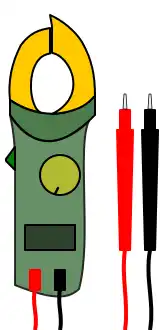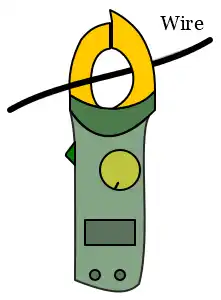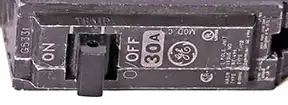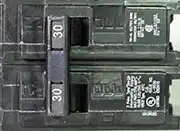
Switches | Outlets & Plugs | Ballasts | Replace Ballasts | LED Tube Lights | Troubleshooting | Basic Electricity | Misc Articles
About Privacy Policy Sitemap Copyright © 2024 Electrical101.com Terms of Use
Circuit Breakers
Circuit breakers protect a circuit from overloads and short circuits. When the current exceeds the rating of the breaker, it will trip. Circuit breaker ratings for household use are typically 15, 20, and 30 amps.
How to Reset a Circuit Breaker
Important! Before resetting a breaker, stand to the side of the electrical panel, do not stand in front. In certain rare situations while resetting a breaker, it could arc flash and injure a person standing in front of the panel.
To reset the breaker, turn the handle away from the middle of the panel (off position) and then turn the handle toward the middle of the panel (on position).
Can I Use a Circuit Breaker as a Switch?
It is fairly common for circuit breakers to act as light switches in warehouses, stores, and commercial environments. It is OK to use a circuit breaker as a switch if the following ratings are listed on the breaker.
- HID This rating indicates a breaker can be used to switch fluorescent lights on a regular basis
- SWD This rating indicates a breaker can be used to switch HID and fluorescent lights on a regular basis
GFCI and AFCI Circuit Breakers
Ground fault circuit interrupter (GFCI) and arc fault interrupter (AFCI) breakers work the same as standard breakers. The GFCI breaker will also trip when current flows to ground instead of back to neutral. The AFCI breaker will also trip when it detects an arc fault. To test either breaker, press the white button and it should trip. If it does not trip, it needs to be replaced. Reset like a standard breaker.
Nuisance Circuit Breaker Tripping
Nuisance tripping happens when a circuit breaker trips during normal conditions (circuit is not overloaded, no ground fault, no apparent arc fault). It could be that the breaker needs to be replaced, or that a load is causing a ground or arc fault. An old vacuum cleaner may be tripping a good AFCI breaker. If a load trips an AFCI breaker, try plugging the load into another circuit with AFCI protection.
Troubleshoot Circuit Breakers
TROUBLESHOOTING CIRCUIT BREAKERS ARE DONE ON AN OPEN LIVE ELECTRICAL PANEL AND SHOULD ONLY BE DONE BY A QUALIFIED ELECTRICIAN. WORKING ON A LIVE ELECTRICAL PANEL RUNS THE RISK OF ELECTROCUTION OR SEVERE ARC FLASH!!! THESE INSTRUCTIONS ARE FOR REFERENCE ONLY.
An electrician can run two tests for breakers, voltage and current.
Voltage test -
Current test -


Voltage test using test leads Current test using clamp
Tripped Circuit Breaker
Circuit Breaker Handle Position
A circuit breaker is in the “on” position when the handle faces the middle of the electrical panel. The “off” position is away from the middle of the panel.
If power is lost to lights, outlets, or appliances it may be a tripped circuit breaker. When a circuit breaker trips, the handle is usually in between on and off position (sometimes in the “off" position).
The main circuit breaker (disconnect) to a house is either located on the meter panel, or at the top or bottom of the main electrical panel. It can be used to shut power down to the whole house. Including the electrical panel.
Circuit Breakers Explained
See Circuit Breakers Explained by Realpars.
Two-Pole Circuit Breakers
Two-
When a circuit breaker trips, the handle usually ends up in between the on and off position.


